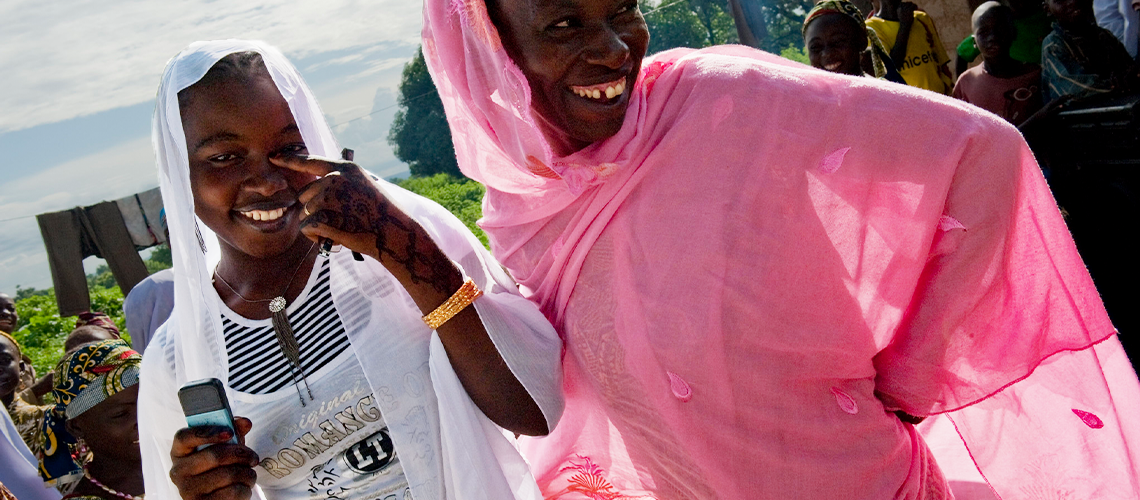How can mobile government (mGov) work in developing countries?

Women of Takalafiya-Lapai village using a mobile phone. Photo: Arne Hoel / World Bank
Since the COVID-19 pandemic started last year, many digitally advanced governments such as Austria have stepped up access to public services via mobile phones. Their experience provides an opportunity for other less digitally advanced countries to leapfrog and rethink their approach to service delivery given the phenomenal growth of mobile use.
The International Telecommunication Union estimates that of the 7 billion people on Earth, 6.5 billion have access to a mobile phone. As of 2018, mobile phone penetration is around 100 percent in low and middle income, and 55 percent in low income countries. In South Africa half the population owns a smartphone as do a third of the people in Ghana, Senegal, and Nigeria.
Despite the enormous potential for mGov in developing countries, there are challenges that are quite different from Austria and the rest of the European Union (EU). In Austria, e-ID was the key enabler for this easy transition to mGov. Globally, however, 1 billion people lack an official proof of identity; 1.7 billion do not have a Bank account. Although average mobile phone subscription globally is nearing 80 percent, wide variations are noted among countries. South Sudan, Kosovo, Central African Republic, and Eritrea have less than 35 percent mobile coverage. Even among countries with wider coverage, two-thirds of their populations don’t have a smart phone which is a prerequisite to access public services in most advanced countries.
However, mobile is still the most transformative widescale technology and can be a powerful tool to help developing countries meet their goals:
mGov can enhance financial inclusion. Mobile money can help distribute cash among the poor, especially when most of them do not have a bank account. To date, 1.2 billion registered users across 95 countries are using mobile money. The infrastructure is being used by dozens of countries for social welfare transfers through Government-to-person (G2P) payment systems.
In Bangladesh, the government is providing cash to 5 million families as part of COVID-19 relief efforts through mobile money accounts. Mobile has reduced corruption and leakages in cash transfers, improved access to financial services, and uplifted the poor to participate in economic activity.
Service delivery significantly expands access through mobile. Mobile has made it possible for the poorest to access health, education, agriculture, and other services.
- The mobile phone is being used to address some of the most pressing health challenges through SMS, including awareness about clean drinking water, birth control, maternal health, stunted growth, emergencies, and other primary health care services. In Pakistan, authorities used mobile phone to combat dengue fever: sanitary workers were provided with a smartphone and required to send geo-tagged pictures of the swamps sprayed. A central team of health experts monitored the coverage of spray across the province through dashboards.
- The use of mobile in the education sector is also leapfrogging. A large number of people as high as a third of study participants from countries like Zimbabwe, Uganda, Nigeria, Pakistan, read stories to their children from mobile phones. In Pakistan, India, and Uganda education authorities use mobile phones to monitor teacher attendance and absenteeism in schools.
- In Agriculture, the mobile phone has been used for early alerts on drought, food shortages, pests, and weather-related calamities in countries like Ethiopia and Uganda.
Mobile phones are the most powerful tools for enabling social accountability.
Citizens can be empowered to report using SMS or geotagged picture. This has applicability in almost every sector. The customers of the Pakistan Passport office – averaging around 15,000 per day across more than 100 offices – receive a text message from the Director General checking if they faced any bribery or other problems.
In India, the Philippines, Uganda, Georgia, and my other countries, governments are promoting the use of SMS to promote social accountability.
A study involving 46 African countries has found that higher mobile phone penetration is significantly correlated with lower levels of perceived corruption.
In conclusion, governments looking to develop their mGov should focus on 3 key takeaways :
First, use of mobile offers immense opportunities for a whole range of development outcomes, but one of the most impactful areas is social accountability. Social accountability should not be an afterthought when embedded upfront in any reform. This should guide the design of the mGov infrastructure as this has a positive effect on all other areas of effective service delivery.
Second, whole-of-government approaches should be promoted when designing and implementing mGov. Although involving every division of the government may be challenging, coordinating across agencies will be worth it as it will reduce duplicative efforts. Citizens will be the ones who will have the most to gain with a more cohesive final product.
Finally, it is critical to involve citizens and civil society. A citizen-centric design is one of the main tenets of GovTech to ensure that it is accessible and user friendly. After all, the whole purpose of mGov is to make service delivery more accessible, efficient and effective .
Editor's Note: This blog is the second part of a two part blog series. You can read part one here.
